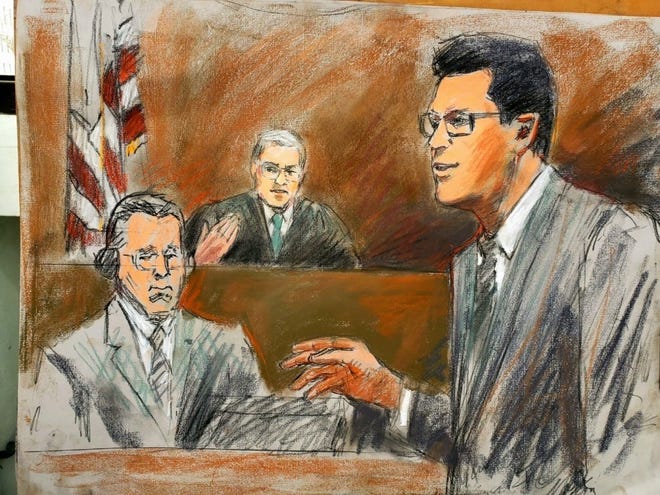So far, the Gov. Gretchen Whitmer kidnapping retrial is shaping up like the last case, if jury selection is any indication.
A jury was seated in one day, just like last time, with the judge handling most of the questioning.
Most of the folks chosen don’t like the news, or pay much attention to it.
And they said they know very little about the high-profile case involving the state’s chief executive, militias and those groups’ disdain for Whitmer’s handling of the pandemic.
While several said they had heard about the case when it initially surfaced two years ago, they noted they have learned very little, if anything, about it since.
More:Will feds salvage Whitmer kidnap case? ‘The key is jury selection,’ experts say
More:2 Whitmer kidnap plot suspects found not guilty; mistrial declared for other 2

What we know about the second Whitmer kidnap jury
A diverse jury was picked this time, whereas the last jury was all white. The panel of 10 women and eight men includes two Black women and one Hispanic male.
Twelve jurors and six alternates were picked to decide the fates of Adam Fox and Barry Croft Jr., who are being retried on charges they orchestrated a plot to kidnap the governor out of anger over her handling of the pandemic. Their first trial in the case ended in a hung jury, with two other defendants acquitted. Two others pleaded guilty early on and will testify in the retrial.
Sixteen of the 18 jurors picked in this sensational case are:
- A chemist who said that he heard about the case in the past, and learned it was in the news again recently, but that “there’s more to the story than what you read.”
- A woman who works from home as an IT solution architect and says her husband has the news on constantly. She said she has some impressions about the case but is willing to listen to the evidence and make an unbiased decision based on that. She said she has strong political views, but didn’t disclose them and said she could set them aside and fairly decide the case.
- A female accountant who says she doesn’t follow the news much.
- A male underwriter for an insurance company who sort of follows the news.
- A female interior designer who said she has no strong political views and tries not to listen to the news.
- A retiree who managed a trucking department and enjoys fishing.
- A Grand Rapids Community College student who also works at Menards as a forklift operator.
- A female factory worker who makes plates for bumpers on F-150 pickup trucks, but said she’s a Chevy person. She doesn’t listen to the news, heard about the kidnapping case when it first happened, but nothing since. “I have no political views,” she said.
- A male freelance graphic designer and illustrator who said he heard of the Whitmer case, but only got “broad strokes.” He said he can be fair.
- A woman who works as an office administrator, doesn’t listen to the news, has a criminal justice degree and has heard about the case. “I respect both sides. I’m not biased,” she said.
- A Grand Rapids woman who works at a gastronenterology office coordinating visits and referrals. She tries to avoid the news and said “I hate politics.” After she cleared the dismissal process, she disclosed that she didn’t like guns or violence, which raised concerns for the defense. But it was too late to excuse her from the case as the defense had already agreed to keep her on. She is an alternate. “I am against guns,” the woman said as the selection process was drawing to a close, explaining that her mother’s husband had a psychotic breakdown and tried to kill her and her family. “I’m just against guns and violence.”
- A female retiree who used to work at a plating factory running a hoist. “I just kind of lay around. … I read,” she said. “I don’t really have an opinion on the case. … I don’t really follow politics.” She said that she has strong political views on some things not tied to the case, and that she can be fair.
- A Grand Haven man with no car or driver’s license who said he would need a ride to trial. He said he rarely follows the news and knows little about the case, other than hearing about it when it first happened.
- A male mechanic who works with heavy equipment, including excavators. He follows mostly local news, enjoys hunting and trapping, owns a shotgun and a deer rifle.
- A woman who works as a nutritionist and doesn’t really follow the news, but said that when she does she gets it from Facebook. She said she could be fair. The judge asked her whether she’d like to serve. She said yes.
- A stay-at-home mom who is preparing to go on a “glamping” trip with her two sons.
The jurors are identified only by number, and descriptions of the remaining two couldn’t be discerned from notes.

‘Only two things matter’
At the start of jury selection, Chief U.S. District Judge Robert Jonker told the prospective jurors that the case is “potentially more challenging and potentially more interesting” than other trials, given its high profile.
“The victim is our sitting governor. There has been publicity. There have been earlier proceedings,” Jonker said, without disclosing that there was a previous trial that ended with no convictions.
Jonker stressed to the jury pool, however, that only two things matter:
“This is not a political forum. It’s not whether you like Gov. Whitmer or don’t like Gov. Whitmer. It’s not whether you think mask mandates was good policy or bad policy,” Jonker said. “Here in court … only two things matter: what the law is, and what the evidence is.”
Mistrust in government
Mistrust in the government appeared to be a top priority during the jury selection process, based on Jonker’s questions and comments.
He asked prospective jurors repeatedly about how they felt about the government, noting that the case is loaded with controversial issues: a sitting governor’s response to the pandemic, mask mandates, lockdowns and an FBI investigation into an alleged plot to kidnap her.
During jury selection in the last trial, the judge asked prospective jurors whether they could set aside their political views or any preconceived ideas about the case. But he didn’t focus as heavily on the topic of mistrust in the government as he did Tuesday, when multiple hands went up when asked whether they had reservations about being fair in this case due to mistrust of the government.
“I don’t like politicians or politics. I don’t personally trust them. … I just don’t particularly trust the government in general,” said one woman, a hairdresser. “It’s a very unpopular opinion to have to say out loud in federal court.”
Jonker told her she wasn’t alone.
“It may of course be one of the more popular opinions these days,” Jonker said before asking the woman whether she believes “the government has a bigger hill to climb.”
More:Prosecutor asserts Crumbleys’ ‘toxic’ family life turned their son into a killer
More:Michigan inmate dying of cancer begs Gov. Whitmer for freedom after 46 years
“At this point in my life, I’m automatically distrusting, it’s always back there in my mind, I don’t trust authority,” the woman said.
Jonker responded:
“It’s not an isolated opinion. A lot of people have a mistrust of government,” Jonker said, before telling the jury pool the government is “entitled to a fair trial, just as the defendants are.”
Who was dismissed from the jury?
The cosmetologist was bounced from the jury pool. So were the following:
- A woman who said she has multiple friends and family members who attended the Jan. 6 rally in Washington, D.C., but were not part of the Capitol breach. She said they had a right to be there to express their opinions.
- A woman who said she had family in the Elk Rapids area, the same city where Whitmer’s vacation home is located. “I don’t think I could be very fair,” she said.
- A retired firefighter and self-described staunch conservative who said he has a strong bias against the defendants. “I hate to say that, but I feel if the case has gone this far and it makes it to court and they haven’t pled out, that they’re guilty. I’m sorry.”
- A male security officer who said he reads the newspaper a lot, has read about the case, and would find it hard to set aside what he’s read. “I don’t think I’d be very fair at this point.”
Staking out Whitmer’s vacation home
Fox and Croft are being retried on kidnapping conspiracy and weapons of mass destruction charges. They are accused of, among other things, casing Whitmer’s vacation house and building explosives that would be used in the kidnapping plan.
Prosecutors said the pair and others plotted to blow up a bridge near Whitmer’s vacation house to slow down law enforcement.
According to trial testimony, Fox, while on his way to scope out Whitmer’s cottage, stopped at a bridge near her house, got out, and took a photograph of the bridge that would be an explosive target. But the defense maintains that an undercover informant came up with the idea of surveilling Whitmer’s home, planned the trip, found the address and convinced the others to make the trip. The defense also says it was the informant who suggested that Fox get out of the car and take a photo of the bridge.
The defense has long argued that the FBI tried to entrap the defendants in a kidnapping plot that was devised and run by FBI agents and informants looking to advance their careers.
The prosecution counters this is a case about violent extremists who wanted to do real harm to the governor because they disagreed with her decisions. And they didn’t just talk about it, they have argued, but took steps to make it happen, like casing her house, buying night vision goggles, building a “shoot house” that looked like her cottage for snatch-n-grab exercises and forming encrypted chat rooms to hide their plan from law enforcement.
If convicted, both men face up to life in prison.
Praise for the judge
After court was adjourned, defense attorney Chris Gibbons said he was pleased with the jury that was empaneled, and that he would now shift his focus on convincing the jury of his long-standing claims: that the FBI orchestrated the kidnapping plot, and ran the whole show.
As for the juror who got on the panel after disclosing her dislike of guns, he said:
“It just is what it is,” Gibbons told reporters after court was adjourned Tuesday.
“I think the judge did a nice job with voir dire today and he certainly did give us an opportunity to ask the questions we thought needed to be asked.”
Opening statements are scheduled for Wednesday morning.
Contact Tresa Baldas: tbaldas@freepress.com